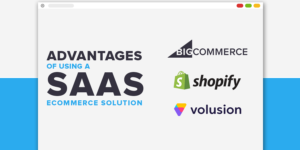Before going into the advantages of using Software as a Service (SaaS) e-Commerce solution, it is prudent to look at what it means. There are two ways that you can power your e-Store: Develop from a custom solution or download an e-Commerce platform and host it or sign up for a store from a provider. Obviously, each approach has its cons and pros. Here’s a look at the pros of signing up for a hosted solution.
1. SaaS platforms have predictable and constant costs
Just like a brick and mortar shop, an e-Store has upfront, recurrent, and periodic costs. Where for a B&M you’d incur the cost of fixtures and fittings, rent, and utilities, e-Shops involve set up, maintenance and management costs. For SaaS solutions such as BigCommerce, there are tiered monthly charges which arise in relation to the number of users required on the back end, customization options and support. These costs are fixed and predetermined, making it easier to budget and plan your finances.
2. It costs less to switch to SaaS e-Commerce platforms
In most cases, switching platforms means writing off the investment made in your old platform since there are no takers for used (unsuccessfully) software. When you switch from one SaaS platform to another, you might just incur the costs of switching. Self-hosted solutions require substantial investment either in time or money paid to experts. This could be a substantial loss, particularly for cash-strapped startups. This is the main reason why we see a lot of users migrating from Magento to Bigcommerce. In cases where the SaaS comes with a free domain, you might not be able to move domains when you switch.
3. SaaS is more reliable than self-hosting
It is possible to ensure your self-hosted e-Commerce solution matches the reliability of SaaS solutions. However, if you have the budget for this, you most probably would not be reading this article. Furthermore, costs associated with ensuring availability and functionality of self-hosted e-Shops could yield better returns when invested in your core business.
4. Ease of use
Usability is hard to pin down. The Android versus iPhone debate is one such example. iPhone users swear by iOS while Android fans claim it is more usable. But as it is said, beauty (read usability), lies in the eyes of the beholder. That having been said, those of us who can’t tell what PHP is and how it relates to JavaScript would find SaaS solutions easier to use.
5. It is easy to scale up SaaS solutions
Every eCommerce entrepreneur longs for the day their venture will attract a million customers. However, what happens when the customers come and your server crashes? You’d be lucky to miss out on sales alone. Oftentimes, the business will die and a competitor with inferior products or imitations will flourish. But SaaS platforms will typically cope with the increased traffic without requiring intervention. Furthermore, when you scale up self-hosted solutions and it turns out the increase was a fluke, you’ll be stuck with increased costs. For SaaS, the increased costs would be a one-time thing.
6. Security
Maintaining your e-Store data integrity and customer privacy is no joke as the frequent reports of security breaches at big-budget e-Stores show. SaaS solutions transfer most of the security burdens to your provider, letting you focus on your business.
7. SaaS e-Commerce software is better supported than self-hosted
Support is hard to objectively quantify. It is a continuation of the never-ending debate on whether open source (e.g. Linux) is better supported than proprietary (e.g. Windows). SaaS solutions are proprietary and closed code, which is why you cannot download and install Shopify or BigCommerce. On the other hand, most self-hosted solutions are open source (eg Magento). Generally, top-tier solutions have excellent support. However, self-hosted solutions require the entrepreneur to stay up to date on platform news. This so as to know when vulnerabilities are discovered and patches or updates released in order to keep the system secure. On the other hand, the maintenance of a SaaS solution is hands-free for the entrepreneur.
8. Payment processing is easier with SaaS
What happens when a customer has shopped on your eStore and wants to check out only to find you don’t support his/her payment method of choice? Such customers will usually take their business elsewhere, never to return even if you start supporting the payment method. Self-hosted solutions will typically need you to configure default payment methods, then buy a plugin or develop one to support the more exotic payment options. Since SaaS providers support a large number of stores and consequently customers, they typically support more payment options. On the other hand, adding a new payment option is difficult as you have to convince the provider to invest in its development.








